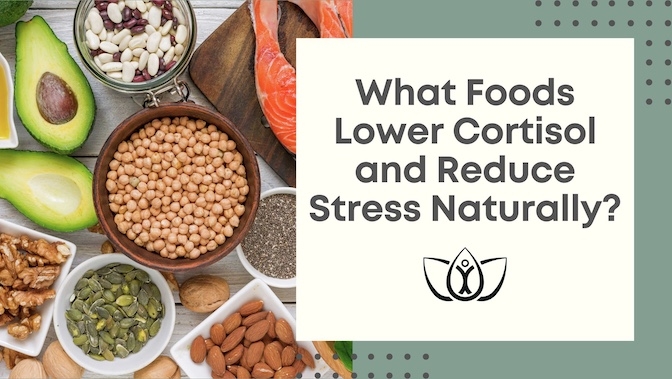.png) Cortisol is generally known as the body's stress hormone, which plays an important role in reaction to both real and perceived stresses. It helps maintain many different processes in the body, such as metabolism, immune response, and even blood sugar regulation. However, increased cortisol levels can contribute to several health concerns, such as anxiety, obesity, and sleeping disorders. Therefore, optimizing your cortisol levels is vital for effectively handling stress and overall physical health.
Cortisol is generally known as the body's stress hormone, which plays an important role in reaction to both real and perceived stresses. It helps maintain many different processes in the body, such as metabolism, immune response, and even blood sugar regulation. However, increased cortisol levels can contribute to several health concerns, such as anxiety, obesity, and sleeping disorders. Therefore, optimizing your cortisol levels is vital for effectively handling stress and overall physical health.By understanding the foods that can help lower cortisol, you can take proactive steps toward managing stress and enhancing your health. Read on to learn about the foods and stress management strategies that can help improve cortisol levels.
Role of Diet in Stress Management
 Food choices contribute to your general health by supplying the macro and micronutrients needed to build the body and power its activity. However, your food selection also impacts your physical stress level. Stress and nutrition are related because food contains chemical messages, whether natural or unnatural, that communicate with your body. Some foods make your body react calmly and improve your mood, while others increase anxiety and stress. For example, omega-3 fatty acids found in fatty fish can help reduce inflammation and enhance brain activity, thus helping to stabilize emotions. On the other hand, processed foods that are often high in sugar and chemical additives can lead to blood sugar spikes and crashes, increased toxic loads, and malnutrition, triggering stress and tension in the body.
Food choices contribute to your general health by supplying the macro and micronutrients needed to build the body and power its activity. However, your food selection also impacts your physical stress level. Stress and nutrition are related because food contains chemical messages, whether natural or unnatural, that communicate with your body. Some foods make your body react calmly and improve your mood, while others increase anxiety and stress. For example, omega-3 fatty acids found in fatty fish can help reduce inflammation and enhance brain activity, thus helping to stabilize emotions. On the other hand, processed foods that are often high in sugar and chemical additives can lead to blood sugar spikes and crashes, increased toxic loads, and malnutrition, triggering stress and tension in the body.A balanced diet filled with whole foods such as lean proteins, fruits, vegetables, and healthy fats can fuel the body without overstressing the system and provide nutrients to help cope with stress. In today's fast-paced world, you should also improve your stress management skills and create a more resilient mindset for tackling life's challenges to care for yourself holistically.
What Happens When Cortisol is High?
When cortisol levels remain chronically high, it can lead to many adverse health concerns, including increased risk for chronic diseases, weight gain, sleep disturbances, cognitive difficulties, and fatigue. Understanding these concerns can help you manage stress more effectively.
Chronic Disease
Extended periods of elevated cortisol levels can cause chronic issues. High cortisol levels increase inflammation and can lead to insulin resistance, thus raising the risk of many diseases. For instance, hypertension is associated with long-term stress because chronically elevated cortisol can narrow the blood vessels, increasing blood pressure. Stress, which can contribute to and be a symptom of anxiety disorders, is also related to high cortisol, adding to the risk of developing chronic conditions if stress isn't effectively managed.
Weight Gain
High cortisol can affect metabolism and cause weight gain, particularly in the abdominal area. Elevated cortisol levels are also known to increase appetite and, when left unchecked, can lead to an unhindered intake of sweets and fatty foods, resulting in weight gain. This hormonal impact influences insulin response, making maintaining a stable blood sugar level almost impossible. Consequently, this results in weight gain. This cycle of stress, elevated cortisol, and imbalanced blood sugar perpetuates the issue and results in a detrimental stress-weight gain loop.
Lack of Energy/Difficulty Sleeping
Cortisol levels should be highest in the morning and fall throughout the day. At night, declining cortisol and increasing melatonin should bring on feelings of sleepiness. When this pattern does not occur, the sleep-wake cycle is affected, causing fatigue, insomnia, or the inability to stay asleep. Excessive stress and increased cortisol levels can also lead to poor sleep quality. For instance, a racing mind or feeling "wired and tired" is common in overly stressed individuals. Being unable to relax and sleep well at night often leads to waking up feeling weak, drained, and easily irritable. A lack of sleep can also cause individuals to reach for unhealthy foods, further contributing to out-of-range cortisol levels. This cycle of high cortisol increased through eating unhealthy foods without the ability to get a restful night's sleep makes it difficult to deal with stress effectively because it continues to escalate, growing worse.
Difficulty Concentrating
High cortisol interferes with cognitive functions, particularly memory and concentration. It is often associated with mental fog or an inability to concentrate on tasks. Research has shown that exposure to high cortisol levels affects parts of the brain, including the hippocampus, which is needed for learning and memory. People may have difficulty remembering details or maintaining focus, which could significantly impact their daily tasks.
Cushing Syndrome
Cushing syndrome occurs when the body is exposed to too much cortisol from endocrine gland malfunction, recurrent stress, or certain medications. Some symptoms include obesity, skin thinning, muscle wasting, and rounding of the face. While other high cortisol symptoms are common, Cushing syndrome is rare and can seriously affect an individual's health. If you're concerned you're at risk for Cushing syndrome, talk with your physician, as this condition requires medical intervention.
Foods That Can Lower Cortisol Levels
Maintaining ideal cortisol levels is crucial for emotional and physical well-being. Include the foods below in your diet to help support effective stress management and promote a healthier lifestyle.
Nutrient-Dense Foods
Salads, berries, and whole grains are some of the best foods containing vitamins, minerals, and antioxidants essential for regulating cortisol levels.Regardless of body weight, a diet lacking vital nutrients can lead to malnourishment, causing increased stress and subsequently heightened cortisol production. Prioritizing a variety of nutrient-dense foods helps provide the nourishment your body requires for optimal stress management.
Omega-3 Fatty Acids
Omega-3 Fatty Acids can be instrumental in fighting inflammation, supporting the brain, and lowering cortisol levels. Good food sources of omega-3 are salmon, mackerel, walnuts, and flax seeds. Help control cortisol levels by including these foods in meals and snacks.
Antioxidant-Rich Foods
Oxidative stress can raise cortisol levels, and foods rich in antioxidants help reduce free radicals that lead to this stress. Dark chocolate, green tea, and various fruits and vegetables, such as blueberries and spinach, are great choices for their antioxidant content. Stress can be better controlled when your diet is rich in antioxidants, leading to more emotional stability.
Probiotics and Gut Health
Poor digestive health is connected with elevated cortisol levels, indicating that gut health and stress are interconnected. Yogurt, kefir, sauerkraut, kimchi, and other foods containing probiotics are beneficial for the digestive system, and proper gut health is essential for a person's overall health and stress management.
Foods to Avoid for Optimal Cortisol Levels
 Foods that contribute to increased cortisol levels should be limited or avoided when striving to regulate stress and lower cortisol levels. To achieve better balance, also consider additional ways to evaluate your holistic health.
Foods that contribute to increased cortisol levels should be limited or avoided when striving to regulate stress and lower cortisol levels. To achieve better balance, also consider additional ways to evaluate your holistic health.
Processed Foods
Processed foods often contain high sugars and unhealthy, additive-laden ingredients that can spike cortisol levels. Items like chips, sugary cereals, and processed meats cause inflammation, trigger stress responses, and lead to hormonal imbalances. To control cortisol, avoid processed foods and adopt whole, nutrient-dense options.
Excessive Caffeine
Caffeine intake increases cortisol secretion, particularly when taken in large amounts. Caffeine-containing products include coffee, energy drinks, and some types of tea. Instead of consuming caffeinated products throughout the day, opt for herbal teas or limit your coffee consumption to moderate amounts in the morning.
Alcohol Consumption
Although moderate alcohol consumption likely does not pose a risk to your health, high consumption is likely to affect your sleep pattern, increase anxiety levels, and raise cortisol levels. Alcohol affects the body's capacity to deal with stress and control cortisol levels. It can elevate cortisol and cause sleep deprivation, which exacerbates stress. Excessive alcohol use causes chronic stress to the body, hormonal imbalances, and taxes the liver. It is best to eliminate alcohol when under stress to help optimize cortisol levels. For women, limit your alcohol intake to one standard drink per day, such as a 12 oz beer or 1.5 oz of 80-proof liquor. For men, limit your alcohol intake to two standard drinks per day.
Take a Nutritional Course to Learn More About Cortisol and Stress
Regulating your cortisol levels through sleep, food, and other stress management techniques can empower you to handle stress better and improve your health. Learn more about nutrition and its impact on health in our Certified Nutritional Consultant program at Trinity School of Natural Health. Start your journey to a better life now and call 800-428-0408, option 2, to speak with one of our Enrollment Specialists, or visit trinityschool.org/program/cnc to learn more and enroll.
References:
https://www.fda.gov/consumers/consumer-updates/food-safe-if-it-has-chemicals
https://yourlatinanutritionist.com/blog/3-tips-for-accepting-weight-gain
https://pmc.ncbi.nlm.nih.gov/articles/PMC5619133/
https://allingoodmeasure.com/blogs/news/5-nutrient-dense-foods
https://www.health.harvard.edu/blog/what-are-ultra-processed-foods-and-are-they-bad-for-our-health-2020010918605
https://www.prevention.va.gov/Healthy_Living/Limit_Alcohol.asp#:~:text=Female%3A%20No%20more%20than%201,than%2014%20drinks%20per%20week

This article was reviewed by Lauren Ameling, DC, BCND. Dr. Lauren Ameling is a 2006 graduate of Logan University, where she earned a Doctor of Chiropractic and a Bachelor of Science in Human Biology. She is a chiropractic physician certified in acupuncture and naturopathy, specializing in traditional Chinese medicine, pregnancy and pediatric care, and kinesiology. Dr. Ameling has worked in healthcare education since 2010 and serves as the Chief Operating Officer of Trinity School of Natural Health.

